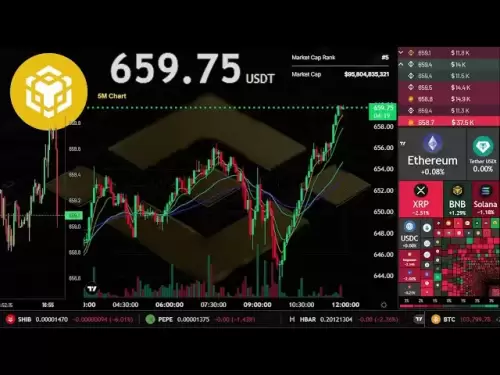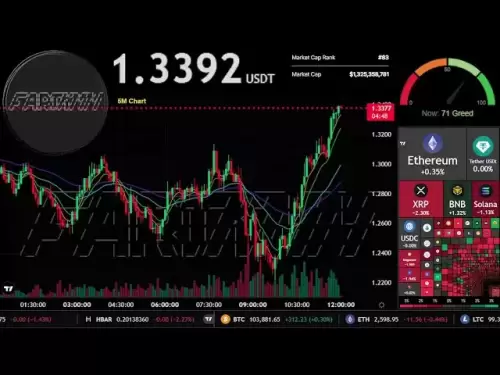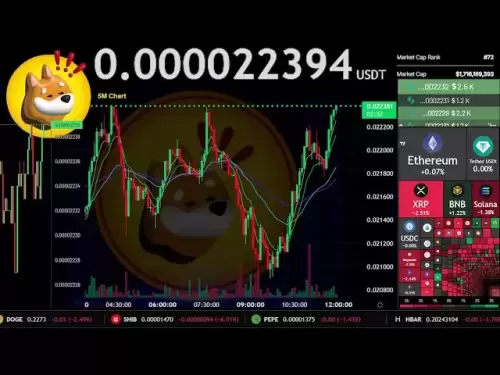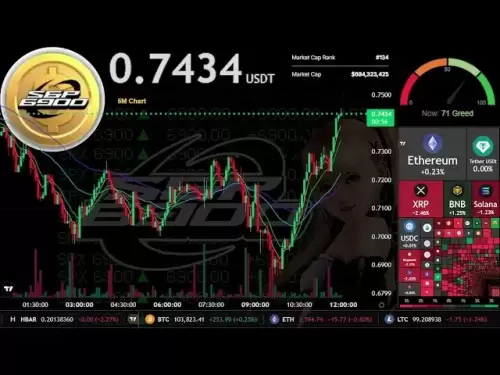 |
|
 |
|
 |
|
 |
|
 |
|
 |
|
 |
|
 |
|
 |
|
 |
|
 |
|
 |
|
 |
|
 |
|
 |
|
Cryptocurrency News Articles
US House Democrats Request All Suspicious Activity Reports (SARs)
May 15, 2025 at 11:43 pm
US House Democrats have officially requested Treasury Secretary Scott Bessent to provide all Suspicious Activity Reports (SARs) regarding cryptocurrency ventures

US House Democrats are requesting Treasury Secretary Scott Bessent to provide all Suspicious Activity Reports (SARs) regarding cryptocurrency ventures linked to President Donald Trump and his family.
In a letter dated 14 May and signed by Congressmen Gerald E. Connolly, Joe Morelle, and Jamie Raskin, concerns were raised about corruption, bribery, election finance violations, and predatory practices, especially against vulnerable citizens.
The request focuses on several entities traceable to the former president, starting with World Liberty Financial (WLF), the crypto platform launched by the Trump family in 2024. The company issued a non-transferrable governance token with no intrinsic economic value and no ownership rights, but nevertheless actively promoted by the president’s circle.
According to the petitioners, this initiative represents one of the most serious conflicts of interest ever documented, even in light of the current administration’s pro-Trump political agenda.
The heating of the case
The case unfolded rapidly in recent months, beginning with an investment of $75 million by Justin Sun, a Chinese entrepreneur under investigation by the SEC for fraud, in WLF itself. Following Sun’s entry into the platform’s capital – which took place in two tranches between January and March – the SEC suspended enforcement action against him.
In March, WLI announced the launch of a stablecoin called USD1. A few days later, a fund linked to an Abu Dhabi investor announced its intention to use USD1 to close a $2 billion deal on the Binance exchange, generating indirect profits for WLF.
This link between stablecoins, international investments and political influence raised the alarm of Ritchie Torres, a Democratic congressman who introduced a bill to prohibit sitting presidents from profiting from stablecoins or digital initiatives with a high risk of conflict of interest.
The $TRUMP contest and access to the president
Special attention was also paid to the launch of the $TRUMP memecoin, which occurred the day before the presidential inauguration. The cryptocurrency, which has no functional purpose, was used to organise a contest guaranteeing an invitation to dinner with Trump to the first 220 buyers of the token.
The user ranking, visible on the coin’s official website, shows only nicknames and wallet codes. No biographical data or geographical limits are required, which has fuelled suspicions about the possibility of foreigners buying political influence via cryptocurrency.
In particular, the wallet linked to the largest buyer of $TRUMP – worth more than $18 million – was associated with Justin Sun himself. A further investment of $300 million in $TRUMP tokens was announced by GD Culture Group, a US-based technology company with ties to a Chinese subsidiary and e-commerce activities on TikTok. The deal coincided with internal debate within the administration over a possible ban or forced sale of the TikTok platform in the US.
The opaque structure of the crypto empire
The structure of the $TRUMP token empire is complex and opaque. Although Donald Trump does not formally own the companies that operate $TRUMP, entities connected to the Trump Organisation control about 80 per cent of the token’s total supply, equivalent to one billion units. From exchange fees alone, according to recent estimates, over $100 million has already been collected.
The legal entities involved include CIC Digital LLC and Fight Fight LLC, both linked to the financial ecosystem of the Trump family, which has also announced the future listing of its own Bitcoin mining company.
In the face of ethical and legal concerns, some parliamentarians, including some Republicans, have spoken out against the $TRUMP contest and WLF’s operations. Senator Richard Blumenthal, for example, opened a formal investigation calling the situation ‘an unprecedented pay-to-play system’.
Meanwhile, the Genius Act, a bipartisan bill to regulate the crypto sector, was blocked due to the implications of the Trump case. Three Republicans joined Democrats in calling for stronger clauses to avoid future cryptocurrency-related conflicts of interest. “The biggest corruption crisis in modern history is unfolding now before our eyes,” said Senator Elizabeth Warren,.
Disclaimer:info@kdj.com
The information provided is not trading advice. kdj.com does not assume any responsibility for any investments made based on the information provided in this article. Cryptocurrencies are highly volatile and it is highly recommended that you invest with caution after thorough research!
If you believe that the content used on this website infringes your copyright, please contact us immediately (info@kdj.com) and we will delete it promptly.
-

-

- Coinbase Reveals It Was the Target of a Social Engineering Attack By Overseas Customer Representatives
- May 16, 2025 at 05:20 am
- Coinbase has revealed that a recent security breach involving a small portion of its user base was the result of a targeted social engineering attack. The company said that overseas customer representatives were offered bribes by criminals trying to reach customer data.
-

-

-

- Solana co-founder's bold proposal for a meta-blockchain could redefine the Layer 2 narrative – just as Solaxy's presale gains traction with a $35M raise.
- May 16, 2025 at 05:10 am
- Solana's bullish momentum continues to gather strength, surging past $170, but beyond price action, a new structural vision from Solana Labs co-founder Anatoly Yakovenko could be the catalyst that elevates Layer 2 infrastructure into the mainstream spotlight.
-

- As institutional giants double down on Bitcoin, a meme coin with real BTC rewards is gaining traction among smart retail investors.
- May 16, 2025 at 05:10 am
- Medical diagnostics firm Semler Scientific is the latest public company to double down on Bitcoin, revealing it now holds 3,808 BTC valued at $395 million.
-

-

-




























































